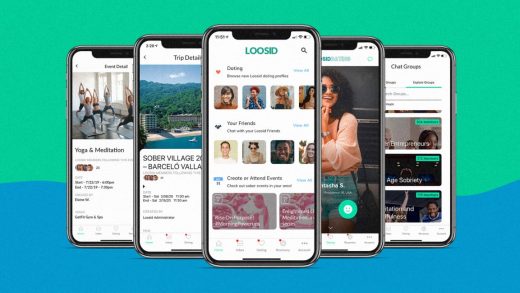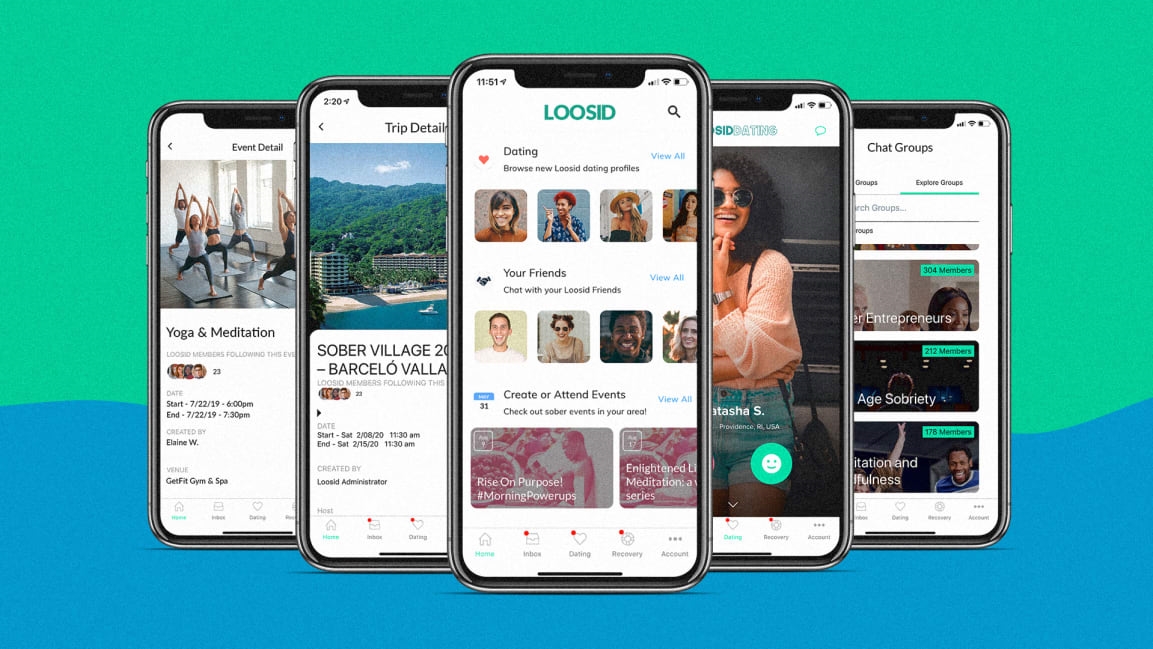Sober curious? There’s an app—in fact, a whole community—for that
When serial entrepreneur MJ Gottlieb, 48, was trying to get sober years ago, he completely avoided drinking establishments. That proved no easy feat when there were at least 14 bars in a two-block radius around his home in New York City and so many friends and colleagues relied on the usual social outings.
“There was like nothing else people would come [up with] than ‘let’s grab a drink’ or ‘let’s tailgate,’” says Gottlieb. “Everything seemed to be centered around alcohol.”
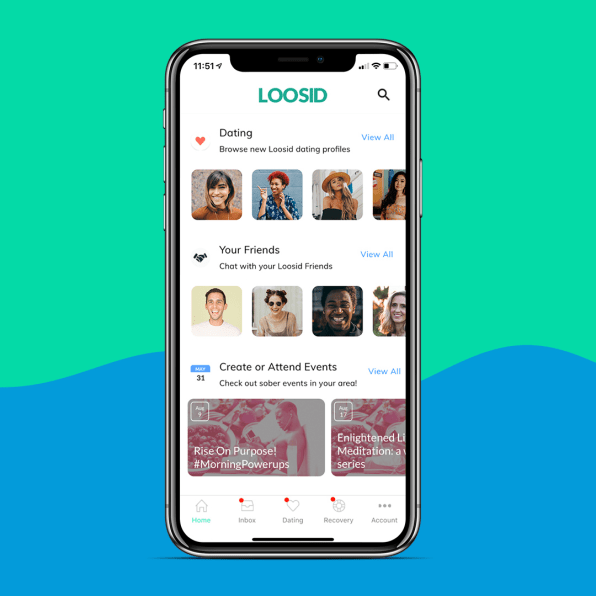
At the time, Gottlieb ran a strategic consulting ?rm which specialized in small brands. To unwind, he inevitably wound up in one of two places: coffee shops and diners. Those became his entire social scene. But it got old, quick.
“I said to myself: Is this all there is?” recalls Gottlieb.
In 2018, Gottlieb co-founded Loosid, a digital community that unites individuals in recovery, those looking for non-alcoholic alternatives, or just the sober curious. It was founded along with Zhanna Basina, former CEO of adult care company Just Home Healthcare Services, and her son Kirill Basin, who previously served as the company’s head of operations.
The app offers an entire suite of sobriety tools, a dating site, travel tips and packages, chat groups, and hosts IRL events. The platform spans a wide range of interests and activities because, as Gottlieb attests, “it’s really important to show people all the different things that you can do without alcohol.”
Loosid is not meant to silo off the sober, but rather to give them the freedom and comfort to easily abide by a lifestyle that often still feels taboo. This is especially true with dating, stresses Gottlieb, who says many members get negative reactions when they suggest anything but grabbing drinks for a first date.
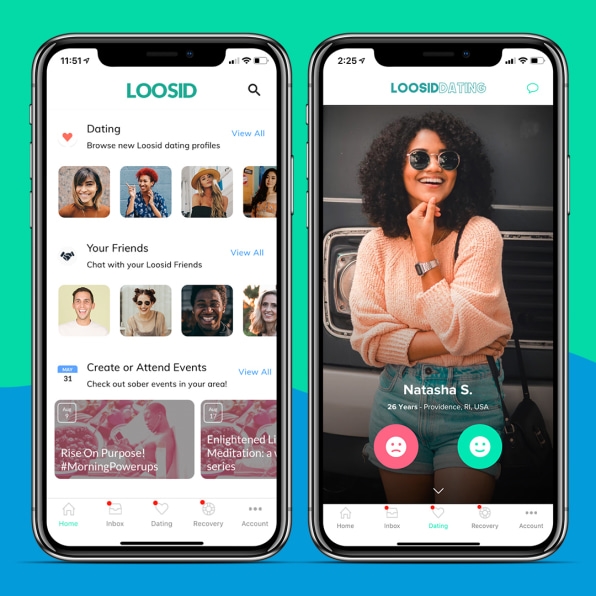
“We want to put groups of people together that share a common bond,” says Gottlieb, who now serves as Loosid CEO. “We need to kill this stigma that not drinking is something to hide or be ashamed of.”
Today, Loosid boasts 41,000 users, many of whom create their own groups like those focused on parenthood, Christianity, rock-climbing, entrepreneurship, even poetry. One group titled “fall lovers” gathers individuals with an appreciation of crisp air, apple picking, Thanksgiving, and October foliage road trips.
“If you really take any individual affinity group, there is a very large population that’s sober,” says Gottlieb. “Most people don’t know that upwards of one third of the American public doesn’t drink.”
Loosid throws events at newly opened sober lounges or establishments such as New York’s Soho House, sometimes hosted by celebrities such as Kelly Osbourne. But over 90% of Loosid meet-ups are organized by the members themselves. The app highlights alcohol-free events in one’s areas—such as yoga classes, concerts, lecture series, and card games.
Gottlieb notes that activities are crucial in the sobriety process, otherwise, “people just stay in their apartments because they have no idea what to do because they’re so programmed to hit happy hours.”
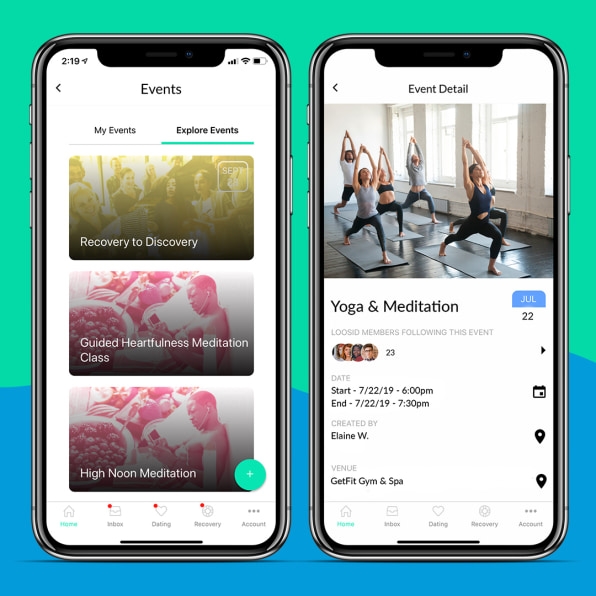
“People are realizing they don’t need social lubricants”
Roughly 70% of Loosid users are in recovery, with the rest sober for other reasons—most notably, for health and wellness. (During the on-boarding process, new members indicate their level of sobriety interest, and the app is then personalized to their needs.) Recent Nielsen data found that 47% of U.S. adults are trying to reduce their alcohol consumption this year, led by a staggering 66% of U.S. millennials. Over 50% cited health as the primary motivator.
Alcohol consumption has been in decline for a number of years across the country (not just coastal cities), says Nielsen client solutions director Matt Crompton. The trend inspired low or alcohol-free alternatives such as faux whiskey Ritual or gin-like Seedlip and, as CB Insights reports, alcohol conglomerates are quickly diversifying their beverage offerings. Non-alcoholic beverages are worth $7 billion more than just four years ago and zero or low-alcohol beer is the fifth-fastest growing beer type.
It’s also propelled restaurants, bars and other establishments to invest in dry drink options.
“People are looking for more occasions that aren’t solely focused on drinking,” says Crompton, noting that one in six U.S. neighborhood bars have closed in the last decade.
Mindful drinking has infiltrated numerous other sectors too. Over 150 colleges and universities in 49 states now have “sober dorms” or collegiate recovery programs. Online, “sober influencers” popularized hashtags like #SoberAF or #SoberIsSexy. Pinterest witnessed searches for “sober living” increase +746% in the last year.
Gottlieb refrains from using the word “trend” to describe the phenomenon, instead framing it as movement with long-lasting effects on society. “America is getting healthier,” he says, “and people are realizing they don’t need social lubricants.”
Loosid is currently available in New York, New Jersey, Connecticut, Philadelphia, D.C., Virginia, Baltimore, California, Florida, Texas, and Atlanta. Over the next nine months., it plans to spread to all major U.S. cities, followed by a European expansion.
The app is currently free but down the line it will introduce paid features and community monetization. For the time being, the team is focused on acquiring new users by way of Facebook, Instagram and Google advertising. One recent online ad for brand’s #livesoberlovesober digital campaign featured a couple in bed accompanied by the tagline, “remember what you did last night”
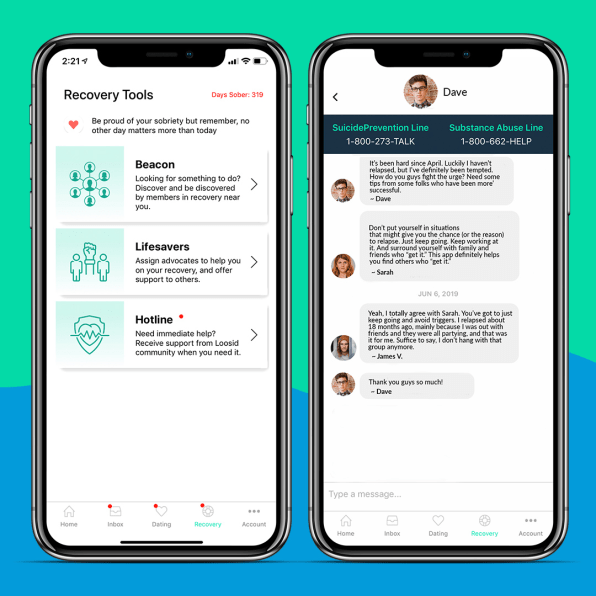
Although Loosid does attempt to help those in recovery, it is currently wary of partnering with sobriety organizations or rehab programs as it takes considerable time and research to check clinical models for their success rates and reputation.
“We have to be very careful who we align with,” explains Gottlieb. “We need to make sure that they’re crystal clean, that their success metrics work.”
But while Loosid doesn’t embody a caregiver model, it does include features that straddle more professional territory. The app offers a hotline where members can essentially shout for help if they feel themselves falling off the wagon. Community members then chime in with words of support and encouragement.
This kind of action is usually exhibited in a 12-step program or AA meetings, though Gottlieb says the distance inherent in the app experience helps those who might otherwise shy away from in-person help. “So many people just don’t want to [publicly] raise their hand at a 12-step group and admit, ‘I screwed up.’”
Gottlieb hopes Loosid can provide life-saving services along with confidence in a lifestyle that many Americans still struggle with, no matter their reason. More than anything, he wants to reframe sobriety as “a symbol of strength,” a tool to help people be more productive and clear-headed in life.
“We’re creating a safe space for people to connect and engage,” says Gottlieb. “And if people don’t need that, then that’s fantastic. But for the people that do, we want to be able to have that platform for people to go to.”
Fast Company , Read Full Story
(32)

